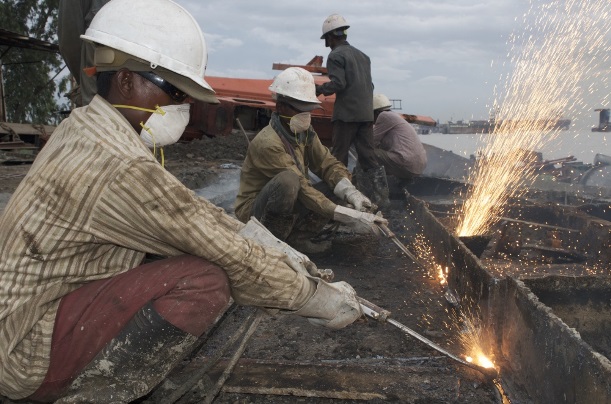 |
| Workers at shipbreaking yards in South Asia work in hazardous situations with little or no safety equipment or environmental oversight. |
Once massive cruise ships and tankers become unprofitable and outdated, most end up in South Asia to be stripped and cut into pieces. Without even basic health, safety or environmental oversight, most shipbreaking workers spend seven days a week, often working 12-hour days, risking their lives to earn near-slave wages.
The most recent deadly incident occurred in Bangladesh where a 22-year old worker died, and another is hospitalized in serious condition, after exposure to toxic gases on the job. Six workers have died in the last four months in Bangladeshi shipbreaking yards alone.
Trans-oceanic tankers can be nearly as long as four football fields and weigh as much as 250,000 tons. They are built using modern technology at sophisticated shipyards in the developed world but they end their lives being broken into pieces in vessel graveyards in Bangladesh, Pakistan and India. It is estimated that hundreds of workers are killed or seriously injured each year in the three countries.
Without unions, most shipbreaking workers endure seemingly unbearable conditions. Exposure to toxic chemicals, asbestos and oil are commonplace as men brought in from poor remote villages spend months breaking vessels into scrap. Dropping steel plates, explosions and falls from decks are among other dangers experienced on a daily basis.
The IAM and other IndustriALL affiliated unions are campaigning to support organizing efforts in South Asia and pushing governments to take responsibility for workers’ safety. IAM Chief of Staff to the International President and Director of the Trade and Globalization Department Owen Herrnstadt is a member of IndustriALL’s Executive Committee.
“It is outrageous that workers in the 20th century must live, work and die in shipbreaking yards under these conditions,” said Herrnstadt.
“Without a voice in the workplace, daily abuses go unchallenged,” says Bangladeshi shipbreaking union leader Nazim Uddin. “Shipbreaking workers have miserable conditions. Workers are paid daily; no work, no pay.”
The Steel Metal and Engineering Workers Federation of India (SMEFI) successfully organized the world’s largest shipbreaking yard, Alang, located in India along the Arabian Sea. SMEFI now has more than 15,000 members at Alang but continued fear of companies firing workers at other yards in the region has made organizing tough.
Success at Alang, where killed workers’ bodies had been flung into the sea, began with the union supplying fresh drinking water and first aid to workers.
To read more about shipbreaking and union efforts for worker safety and cleaning up the industry, click here.
IndustriALL Global Union is an affiliation of industrial unions capable of challenging the power of multinational companies and negotiating with them on a global level.